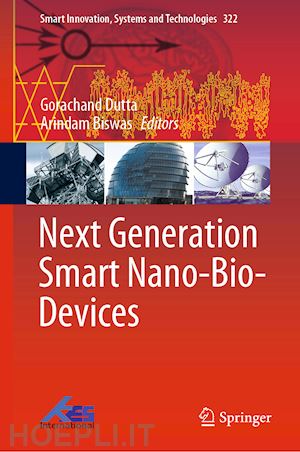
Questo prodotto usufruisce delle SPEDIZIONI GRATIS
selezionando l'opzione Corriere Veloce in fase di ordine.
Pagabile anche con Carta della cultura giovani e del merito, 18App Bonus Cultura e Carta del Docente
This book addresses challenges for the development of a point-of-care-test platform. The book describes printed chip-based assay (Lab-on-a-Chip, Lab-on-a-PCB) for rapid, inexpensive biomarkers detection in real samples. The main challenges of point-of-care testing require implementing complex analytical methods into low-cost technologies. This is particularly true for countries with less developed healthcare infrastructure. Washing-free, Lab-on-Chip, and Lab-on-PCB techniques are very simple and innovative for point-of-care device development. The redox cycling technology detects several interesting targets at the same time on a printed chip. The proposed areas are inherently cross-disciplinary, combining expertise in biosensing, electrochemistry, electronics and electrical engineering, health care, and manufacturing. This book focuses on recent advances and different research issues in the nanobiotechnology-enabled biosensor technology and also seeks out theoretical, methodological, well-established, and validated empirical work dealing with these different topics.
Dr. Gorachand Dutta is Assistant Professor at School of Medical Science and Technology, IIT Kharagpur. He received M.Sc. degree in Chemistry from Indian Institute of Technology, Guwahati, India. His research interests include the design and characterization of portable biosensors, biodevices, and sensor interfaces for miniaturized systems and biomedical applications for point-of-care testing. He received his Ph.D. in Biosensor and Electrochemistry from Pusan National University, South Korea, where he developed different class of electrochemical sensors and studied the electrochemical properties of gold, platinum, and palladium-based metal electrodes. He completed his postdoctoral fellowships in the Department of Mechanical Engineering, Michigan State University, USA, Department of Chemistry, Pusan National University, South Korea, and Centre for Biosensors, Bioelectronics and Biodevices at University of Bath, UK. During his research tenure in USA and South Korea, Dr. Dutta invented an enzyme-free, disposable miniaturized immunosensor chip using micropatterned electrode and wash-free method for the development of mobile phone-based platforms for fast and simple point-of-care testing of infectious and metabolic disease biomarkers. He has expertise on label-free multichannel electrochemical biosensors, electronically addressable biosensor arrays, aptamer- and DNA-based sensors, and surface bio-functionalization.
Dr. Arindam Biswas received M. Tech. degree in Radio Physics and Electronics from University of Calcutta, India, in 2010 and Ph.D. from NIT Durgapur in 2013. He has worked as Postdoctoral Researcher at Pusan National University, South Korea, with prestigious BK21PLUS Fellowship, Republic of Korea 2015, DST-JSPS Invitation Research Grant Award in 2020, and DST-ASEAN S&T Development Grant Award 2021. He was Visiting Professor at Research Institute of Electronics, Shizouka University, Japan. He has been selected for IE(I) Young Engineer Award : 2019-20 from Institute of Engineers (I), India. Dr. Biswas has 12 years of experience in teaching research and administration. Presently, Dr. Biswas is working as Associate Professor in School of Mines and Metallurgy at Kazi Nazrul University, Asansol, WB, India. He has 53 technical papers in different journals, 35 conference proceedings, 7 books, 8 edited volumes, and 6 chapters with international repute. Dr. Biswas received research grant from Science and Engineering Research Board, Government of India, under Early Career Research Scheme for research in terahertz-based GaN source. He has also received research grant from Centre of Biomedical Engineering, Tokyo Medical & Dental University in association with RIE, Shizouka University, Japan, for study of biomedical THz imaging based on WBG semiconductor IMPATT source for two consecutive years 2019-20 and 2020-2021. Presently, Dr. Biswas has served as Associate Editor of Cluster Computing, Springer (SCI Indexed). Dr. Biswas has produced 05 Ph.D. students in different topics of applied optics and high-frequency semiconductor device. He has organized and chaired different international conferences in India and abroad. His research interest is in carrier transport in low-dimensional system and electronic device, nonlinear optical communication, and THz semiconductor source. Dr. Biswas acted as Reviewer for reputed journals, Member of the Institute of Engineers (India), and Regular Fellow of Optical Society of India (India).











Il sito utilizza cookie ed altri strumenti di tracciamento che raccolgono informazioni dal dispositivo dell’utente. Oltre ai cookie tecnici ed analitici aggregati, strettamente necessari per il funzionamento di questo sito web, previo consenso dell’utente possono essere installati cookie di profilazione e marketing e cookie dei social media. Cliccando su “Accetto tutti i cookie” saranno attivate tutte le categorie di cookie. Per accettare solo deterninate categorie di cookie, cliccare invece su “Impostazioni cookie”. Chiudendo il banner o continuando a navigare saranno installati solo cookie tecnici. Per maggiori dettagli, consultare la Cookie Policy.